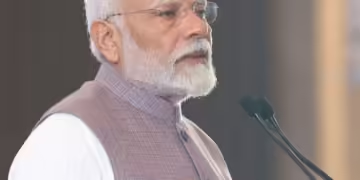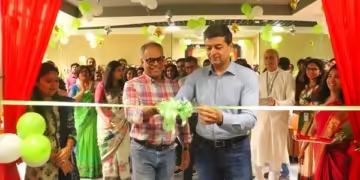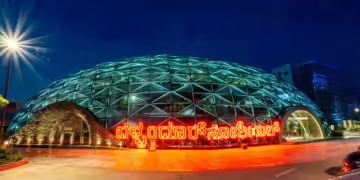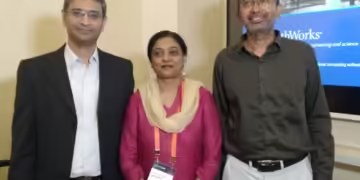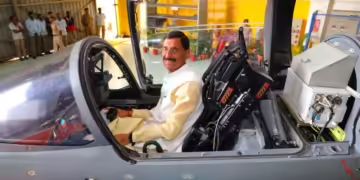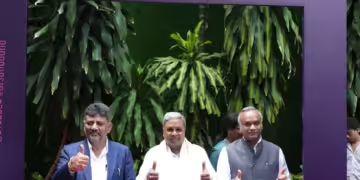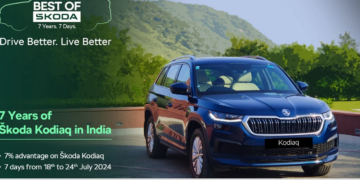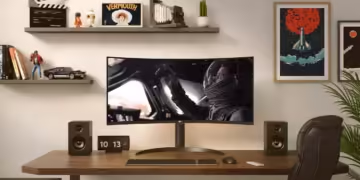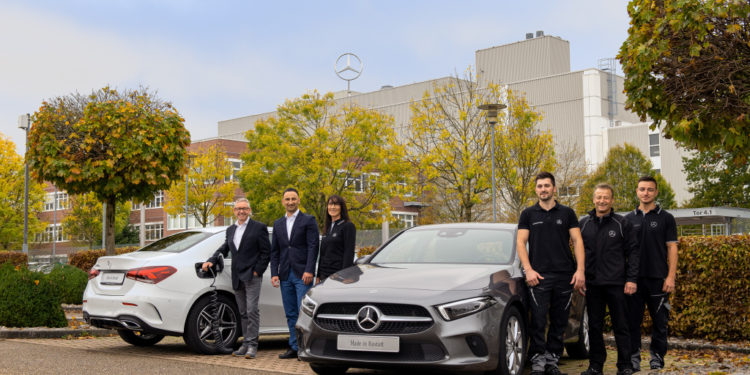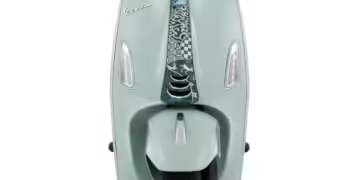Rastatt. The electric initiative in the Mercedes-Benz Cars global production network has reached its next milestone: the production launch of the first Mercedes-Benz compact vehicles with plug-in hybrid drive at the Mercedes-Benz Rastatt plant in southern Germany is an important strategic step for the plant, and was successfully implemented. Supported by a systematic digitisation of production processes, Mercedes-Benz Rastatt plant and its highly skilled team have implemented the simultaneous ramp up of two body variants: the A 250 e (combined fuel consumption 1.5-1.4 l/100 km, combined power consumption 15.0-14.8 kWh/100 km, electric range 74 km, combined CO2 emissions 34-33 g/km)[1] plus the A 250 e Sedan (combined fuel consumption 1.4 l/100 km, combined power consumption 14.8 -14.7 kWh/100 km, electric range 75 km, combined CO2 emissions 33-32 g/km)1. The Mercedes-Benz A and B-Class with hybrid drive celebrated their world premiere at the 2019 International Motor Show (IAA) in Frankfurt am Main in Germany. Plug-in hybrids are an important milestone on the road to emission-free driving. The focus of the new compact vehicles with plug-in hybrid drive EQ Power is on (electric) driving pleasure and everyday usability. The electric range consists of 70 to 75 km (NEFZ). By 2039, Mercedes-Benz Cars is targeting a CO2-neutral new car fleet, and by 2030 the company is already targeting more than 50% of passenger car sales from plug-in hybrids or full-electric vehicles. This also applies to the production process itself: since 2011 the Mercedes-Benz Rastatt plant has already implemented various measures which have nearly halved the specific CO2 emissions per vehicle in production.
“The production launch of the Mercedes-Benz A-class in two plug-in hybrid models is a strategic milestone as part of our global electric initiative. We are thus increasing the Mercedes-Benz plug-in hybrid offering and expanding it to include our high volume compact car segment for the first time. By simultaneously launching production of two A-Class plug-in hybrid models, the Mercedes-Benz Rastatt plant once again demonstrates its enormous flexibility and efficiency in the Mercedes-Benz Cars global production network. The Mercedes-Benz Rastatt plant is therefore optimally prepared for the upcoming production launch of the hybrid B-Class,” says Jörg Burzer, Member of the Board of Management of Mercedes-Benz AG, responsible for Production and Supply Chain Management.
Supported by a host of digital processes, such as working with mobile devices, automatically guided transport systems (AGVs) and a paperless factory, Rastatt plant employees can respond flexibly and efficiently to a various customizations, such as optional extras and drive variants. Mercedes-Benz Cars’ high production standards in ensure high quality around the world and across all vehicle types.
“In producing the new A-Class with EQ Power, the Mercedes-Benz Rastatt plant is beginning a new era and reinforcing its importance in the global Mercedes-Benz Cars production network. Our team has prepared meticulously for this new challenge and have once again confirmed what they stand for: first-class quality, competence and also outstanding performance. The Rastatt plant and its highly motivated staff are also superbly positioned to produce the forthcoming compact Mercedes-Benz electric vehicles,” says Thomas Geier, Site Manager of the Mercedes-Benz Rastatt plant.
The A-Class with plug-in hybrid drive is being produced on the same line at the Mercedes-Benz Rastatt plant as models with conventional drive systems. The production of vehicles with different drive types can therefore be adapted flexibly and efficiently. The plant is thus working at optimal capacity and the Mercedes-Benz high production and quality standard are guaranteed.
“The Rastatt plant is already on the road to transformation, moving towards new technologies, drive system types and changes to the scope of work. As part of this, the ramp up of the compact plug-in hybrids marks a milestone. Therefore, safety is a key issue: security of the site, of our colleagues’ workplaces, of the region and of the future of our workforce. The future is ours because of the safeguards we are putting in place,” says Murat Sür, Chairman of the Works Council at the Mercedes-Benz Rastatt plant.
The Mercedes-Benz Rastatt plant gained its initial experience building electric vehicles from 2014 to 2017. During this period the B 250 e (combined power consumption 16.6 kWh/100 km, combined CO2 emissions: 0 g/km)[2] , a vehicle with an all-electric drive system and a standard range of up to 230 kilometres, was produced.
Rastatt. The electric initiative in the Mercedes-Benz Cars global production network has reached its next milestone: the production launch of the first Mercedes-Benz compact vehicles with plug-in hybrid drive at the Mercedes-Benz Rastatt plant in southern Germany is an important strategic step for the plant, and was successfully implemented. Supported by a systematic digitisation of production processes, Mercedes-Benz Rastatt plant and its highly skilled team have implemented the simultaneous ramp up of two body variants: the A 250 e (combined fuel consumption 1.5-1.4 l/100 km, combined power consumption 15.0-14.8 kWh/100 km, electric range 74 km, combined CO2 emissions 34-33 g/km)[1] plus the A 250 e Sedan (combined fuel consumption 1.4 l/100 km, combined power consumption 14.8 -14.7 kWh/100 km, electric range 75 km, combined CO2 emissions 33-32 g/km)1. The Mercedes-Benz A and B-Class with hybrid drive celebrated their world premiere at the 2019 International Motor Show (IAA) in Frankfurt am Main in Germany. Plug-in hybrids are an important milestone on the road to emission-free driving. The focus of the new compact vehicles with plug-in hybrid drive EQ Power is on (electric) driving pleasure and everyday usability. The electric range consists of 70 to 75 km (NEFZ). By 2039, Mercedes-Benz Cars is targeting a CO2-neutral new car fleet, and by 2030 the company is already targeting more than 50% of passenger car sales from plug-in hybrids or full-electric vehicles. This also applies to the production process itself: since 2011 the Mercedes-Benz Rastatt plant has already implemented various measures which have nearly halved the specific CO2 emissions per vehicle in production.
“The production launch of the Mercedes-Benz A-class in two plug-in hybrid models is a strategic milestone as part of our global electric initiative. We are thus increasing the Mercedes-Benz plug-in hybrid offering and expanding it to include our high volume compact car segment for the first time. By simultaneously launching production of two A-Class plug-in hybrid models, the Mercedes-Benz Rastatt plant once again demonstrates its enormous flexibility and efficiency in the Mercedes-Benz Cars global production network. The Mercedes-Benz Rastatt plant is therefore optimally prepared for the upcoming production launch of the hybrid B-Class,” says Jörg Burzer, Member of the Board of Management of Mercedes-Benz AG, responsible for Production and Supply Chain Management.
Supported by a host of digital processes, such as working with mobile devices, automatically guided transport systems (AGVs) and a paperless factory, Rastatt plant employees can respond flexibly and efficiently to a various customizations, such as optional extras and drive variants. Mercedes-Benz Cars’ high production standards in ensure high quality around the world and across all vehicle types.
“In producing the new A-Class with EQ Power, the Mercedes-Benz Rastatt plant is beginning a new era and reinforcing its importance in the global Mercedes-Benz Cars production network. Our team has prepared meticulously for this new challenge and have once again confirmed what they stand for: first-class quality, competence and also outstanding performance. The Rastatt plant and its highly motivated staff are also superbly positioned to produce the forthcoming compact Mercedes-Benz electric vehicles,” says Thomas Geier, Site Manager of the Mercedes-Benz Rastatt plant.
The A-Class with plug-in hybrid drive is being produced on the same line at the Mercedes-Benz Rastatt plant as models with conventional drive systems. The production of vehicles with different drive types can therefore be adapted flexibly and efficiently. The plant is thus working at optimal capacity and the Mercedes-Benz high production and quality standard are guaranteed.
“The Rastatt plant is already on the road to transformation, moving towards new technologies, drive system types and changes to the scope of work. As part of this, the ramp up of the compact plug-in hybrids marks a milestone. Therefore, safety is a key issue: security of the site, of our colleagues’ workplaces, of the region and of the future of our workforce. The future is ours because of the safeguards we are putting in place,” says Murat Sür, Chairman of the Works Council at the Mercedes-Benz Rastatt plant.
The Mercedes-Benz Rastatt plant gained its initial experience building electric vehicles from 2014 to 2017. During this period the B 250 e (combined power consumption 16.6 kWh/100 km, combined CO2 emissions: 0 g/km)[2] , a vehicle with an all-electric drive system and a standard range of up to 230 kilometres, was produced.
Rastatt. The electric initiative in the Mercedes-Benz Cars global production network has reached its next milestone: the production launch of the first Mercedes-Benz compact vehicles with plug-in hybrid drive at the Mercedes-Benz Rastatt plant in southern Germany is an important strategic step for the plant, and was successfully implemented. Supported by a systematic digitisation of production processes, Mercedes-Benz Rastatt plant and its highly skilled team have implemented the simultaneous ramp up of two body variants: the A 250 e (combined fuel consumption 1.5-1.4 l/100 km, combined power consumption 15.0-14.8 kWh/100 km, electric range 74 km, combined CO2 emissions 34-33 g/km)[1] plus the A 250 e Sedan (combined fuel consumption 1.4 l/100 km, combined power consumption 14.8 -14.7 kWh/100 km, electric range 75 km, combined CO2 emissions 33-32 g/km)1. The Mercedes-Benz A and B-Class with hybrid drive celebrated their world premiere at the 2019 International Motor Show (IAA) in Frankfurt am Main in Germany. Plug-in hybrids are an important milestone on the road to emission-free driving. The focus of the new compact vehicles with plug-in hybrid drive EQ Power is on (electric) driving pleasure and everyday usability. The electric range consists of 70 to 75 km (NEFZ). By 2039, Mercedes-Benz Cars is targeting a CO2-neutral new car fleet, and by 2030 the company is already targeting more than 50% of passenger car sales from plug-in hybrids or full-electric vehicles. This also applies to the production process itself: since 2011 the Mercedes-Benz Rastatt plant has already implemented various measures which have nearly halved the specific CO2 emissions per vehicle in production.
“The production launch of the Mercedes-Benz A-class in two plug-in hybrid models is a strategic milestone as part of our global electric initiative. We are thus increasing the Mercedes-Benz plug-in hybrid offering and expanding it to include our high volume compact car segment for the first time. By simultaneously launching production of two A-Class plug-in hybrid models, the Mercedes-Benz Rastatt plant once again demonstrates its enormous flexibility and efficiency in the Mercedes-Benz Cars global production network. The Mercedes-Benz Rastatt plant is therefore optimally prepared for the upcoming production launch of the hybrid B-Class,” says Jörg Burzer, Member of the Board of Management of Mercedes-Benz AG, responsible for Production and Supply Chain Management.
Supported by a host of digital processes, such as working with mobile devices, automatically guided transport systems (AGVs) and a paperless factory, Rastatt plant employees can respond flexibly and efficiently to a various customizations, such as optional extras and drive variants. Mercedes-Benz Cars’ high production standards in ensure high quality around the world and across all vehicle types.
“In producing the new A-Class with EQ Power, the Mercedes-Benz Rastatt plant is beginning a new era and reinforcing its importance in the global Mercedes-Benz Cars production network. Our team has prepared meticulously for this new challenge and have once again confirmed what they stand for: first-class quality, competence and also outstanding performance. The Rastatt plant and its highly motivated staff are also superbly positioned to produce the forthcoming compact Mercedes-Benz electric vehicles,” says Thomas Geier, Site Manager of the Mercedes-Benz Rastatt plant.
The A-Class with plug-in hybrid drive is being produced on the same line at the Mercedes-Benz Rastatt plant as models with conventional drive systems. The production of vehicles with different drive types can therefore be adapted flexibly and efficiently. The plant is thus working at optimal capacity and the Mercedes-Benz high production and quality standard are guaranteed.
“The Rastatt plant is already on the road to transformation, moving towards new technologies, drive system types and changes to the scope of work. As part of this, the ramp up of the compact plug-in hybrids marks a milestone. Therefore, safety is a key issue: security of the site, of our colleagues’ workplaces, of the region and of the future of our workforce. The future is ours because of the safeguards we are putting in place,” says Murat Sür, Chairman of the Works Council at the Mercedes-Benz Rastatt plant.
The Mercedes-Benz Rastatt plant gained its initial experience building electric vehicles from 2014 to 2017. During this period the B 250 e (combined power consumption 16.6 kWh/100 km, combined CO2 emissions: 0 g/km)[2] , a vehicle with an all-electric drive system and a standard range of up to 230 kilometres, was produced.
Rastatt. The electric initiative in the Mercedes-Benz Cars global production network has reached its next milestone: the production launch of the first Mercedes-Benz compact vehicles with plug-in hybrid drive at the Mercedes-Benz Rastatt plant in southern Germany is an important strategic step for the plant, and was successfully implemented. Supported by a systematic digitisation of production processes, Mercedes-Benz Rastatt plant and its highly skilled team have implemented the simultaneous ramp up of two body variants: the A 250 e (combined fuel consumption 1.5-1.4 l/100 km, combined power consumption 15.0-14.8 kWh/100 km, electric range 74 km, combined CO2 emissions 34-33 g/km)[1] plus the A 250 e Sedan (combined fuel consumption 1.4 l/100 km, combined power consumption 14.8 -14.7 kWh/100 km, electric range 75 km, combined CO2 emissions 33-32 g/km)1. The Mercedes-Benz A and B-Class with hybrid drive celebrated their world premiere at the 2019 International Motor Show (IAA) in Frankfurt am Main in Germany. Plug-in hybrids are an important milestone on the road to emission-free driving. The focus of the new compact vehicles with plug-in hybrid drive EQ Power is on (electric) driving pleasure and everyday usability. The electric range consists of 70 to 75 km (NEFZ). By 2039, Mercedes-Benz Cars is targeting a CO2-neutral new car fleet, and by 2030 the company is already targeting more than 50% of passenger car sales from plug-in hybrids or full-electric vehicles. This also applies to the production process itself: since 2011 the Mercedes-Benz Rastatt plant has already implemented various measures which have nearly halved the specific CO2 emissions per vehicle in production.
“The production launch of the Mercedes-Benz A-class in two plug-in hybrid models is a strategic milestone as part of our global electric initiative. We are thus increasing the Mercedes-Benz plug-in hybrid offering and expanding it to include our high volume compact car segment for the first time. By simultaneously launching production of two A-Class plug-in hybrid models, the Mercedes-Benz Rastatt plant once again demonstrates its enormous flexibility and efficiency in the Mercedes-Benz Cars global production network. The Mercedes-Benz Rastatt plant is therefore optimally prepared for the upcoming production launch of the hybrid B-Class,” says Jörg Burzer, Member of the Board of Management of Mercedes-Benz AG, responsible for Production and Supply Chain Management.
Supported by a host of digital processes, such as working with mobile devices, automatically guided transport systems (AGVs) and a paperless factory, Rastatt plant employees can respond flexibly and efficiently to a various customizations, such as optional extras and drive variants. Mercedes-Benz Cars’ high production standards in ensure high quality around the world and across all vehicle types.
“In producing the new A-Class with EQ Power, the Mercedes-Benz Rastatt plant is beginning a new era and reinforcing its importance in the global Mercedes-Benz Cars production network. Our team has prepared meticulously for this new challenge and have once again confirmed what they stand for: first-class quality, competence and also outstanding performance. The Rastatt plant and its highly motivated staff are also superbly positioned to produce the forthcoming compact Mercedes-Benz electric vehicles,” says Thomas Geier, Site Manager of the Mercedes-Benz Rastatt plant.
The A-Class with plug-in hybrid drive is being produced on the same line at the Mercedes-Benz Rastatt plant as models with conventional drive systems. The production of vehicles with different drive types can therefore be adapted flexibly and efficiently. The plant is thus working at optimal capacity and the Mercedes-Benz high production and quality standard are guaranteed.
“The Rastatt plant is already on the road to transformation, moving towards new technologies, drive system types and changes to the scope of work. As part of this, the ramp up of the compact plug-in hybrids marks a milestone. Therefore, safety is a key issue: security of the site, of our colleagues’ workplaces, of the region and of the future of our workforce. The future is ours because of the safeguards we are putting in place,” says Murat Sür, Chairman of the Works Council at the Mercedes-Benz Rastatt plant.
The Mercedes-Benz Rastatt plant gained its initial experience building electric vehicles from 2014 to 2017. During this period the B 250 e (combined power consumption 16.6 kWh/100 km, combined CO2 emissions: 0 g/km)[2] , a vehicle with an all-electric drive system and a standard range of up to 230 kilometres, was produced.
Rastatt. The electric initiative in the Mercedes-Benz Cars global production network has reached its next milestone: the production launch of the first Mercedes-Benz compact vehicles with plug-in hybrid drive at the Mercedes-Benz Rastatt plant in southern Germany is an important strategic step for the plant, and was successfully implemented. Supported by a systematic digitisation of production processes, Mercedes-Benz Rastatt plant and its highly skilled team have implemented the simultaneous ramp up of two body variants: the A 250 e (combined fuel consumption 1.5-1.4 l/100 km, combined power consumption 15.0-14.8 kWh/100 km, electric range 74 km, combined CO2 emissions 34-33 g/km)[1] plus the A 250 e Sedan (combined fuel consumption 1.4 l/100 km, combined power consumption 14.8 -14.7 kWh/100 km, electric range 75 km, combined CO2 emissions 33-32 g/km)1. The Mercedes-Benz A and B-Class with hybrid drive celebrated their world premiere at the 2019 International Motor Show (IAA) in Frankfurt am Main in Germany. Plug-in hybrids are an important milestone on the road to emission-free driving. The focus of the new compact vehicles with plug-in hybrid drive EQ Power is on (electric) driving pleasure and everyday usability. The electric range consists of 70 to 75 km (NEFZ). By 2039, Mercedes-Benz Cars is targeting a CO2-neutral new car fleet, and by 2030 the company is already targeting more than 50% of passenger car sales from plug-in hybrids or full-electric vehicles. This also applies to the production process itself: since 2011 the Mercedes-Benz Rastatt plant has already implemented various measures which have nearly halved the specific CO2 emissions per vehicle in production.
“The production launch of the Mercedes-Benz A-class in two plug-in hybrid models is a strategic milestone as part of our global electric initiative. We are thus increasing the Mercedes-Benz plug-in hybrid offering and expanding it to include our high volume compact car segment for the first time. By simultaneously launching production of two A-Class plug-in hybrid models, the Mercedes-Benz Rastatt plant once again demonstrates its enormous flexibility and efficiency in the Mercedes-Benz Cars global production network. The Mercedes-Benz Rastatt plant is therefore optimally prepared for the upcoming production launch of the hybrid B-Class,” says Jörg Burzer, Member of the Board of Management of Mercedes-Benz AG, responsible for Production and Supply Chain Management.
Supported by a host of digital processes, such as working with mobile devices, automatically guided transport systems (AGVs) and a paperless factory, Rastatt plant employees can respond flexibly and efficiently to a various customizations, such as optional extras and drive variants. Mercedes-Benz Cars’ high production standards in ensure high quality around the world and across all vehicle types.
“In producing the new A-Class with EQ Power, the Mercedes-Benz Rastatt plant is beginning a new era and reinforcing its importance in the global Mercedes-Benz Cars production network. Our team has prepared meticulously for this new challenge and have once again confirmed what they stand for: first-class quality, competence and also outstanding performance. The Rastatt plant and its highly motivated staff are also superbly positioned to produce the forthcoming compact Mercedes-Benz electric vehicles,” says Thomas Geier, Site Manager of the Mercedes-Benz Rastatt plant.
The A-Class with plug-in hybrid drive is being produced on the same line at the Mercedes-Benz Rastatt plant as models with conventional drive systems. The production of vehicles with different drive types can therefore be adapted flexibly and efficiently. The plant is thus working at optimal capacity and the Mercedes-Benz high production and quality standard are guaranteed.
“The Rastatt plant is already on the road to transformation, moving towards new technologies, drive system types and changes to the scope of work. As part of this, the ramp up of the compact plug-in hybrids marks a milestone. Therefore, safety is a key issue: security of the site, of our colleagues’ workplaces, of the region and of the future of our workforce. The future is ours because of the safeguards we are putting in place,” says Murat Sür, Chairman of the Works Council at the Mercedes-Benz Rastatt plant.
The Mercedes-Benz Rastatt plant gained its initial experience building electric vehicles from 2014 to 2017. During this period the B 250 e (combined power consumption 16.6 kWh/100 km, combined CO2 emissions: 0 g/km)[2] , a vehicle with an all-electric drive system and a standard range of up to 230 kilometres, was produced.
Rastatt. The electric initiative in the Mercedes-Benz Cars global production network has reached its next milestone: the production launch of the first Mercedes-Benz compact vehicles with plug-in hybrid drive at the Mercedes-Benz Rastatt plant in southern Germany is an important strategic step for the plant, and was successfully implemented. Supported by a systematic digitisation of production processes, Mercedes-Benz Rastatt plant and its highly skilled team have implemented the simultaneous ramp up of two body variants: the A 250 e (combined fuel consumption 1.5-1.4 l/100 km, combined power consumption 15.0-14.8 kWh/100 km, electric range 74 km, combined CO2 emissions 34-33 g/km)[1] plus the A 250 e Sedan (combined fuel consumption 1.4 l/100 km, combined power consumption 14.8 -14.7 kWh/100 km, electric range 75 km, combined CO2 emissions 33-32 g/km)1. The Mercedes-Benz A and B-Class with hybrid drive celebrated their world premiere at the 2019 International Motor Show (IAA) in Frankfurt am Main in Germany. Plug-in hybrids are an important milestone on the road to emission-free driving. The focus of the new compact vehicles with plug-in hybrid drive EQ Power is on (electric) driving pleasure and everyday usability. The electric range consists of 70 to 75 km (NEFZ). By 2039, Mercedes-Benz Cars is targeting a CO2-neutral new car fleet, and by 2030 the company is already targeting more than 50% of passenger car sales from plug-in hybrids or full-electric vehicles. This also applies to the production process itself: since 2011 the Mercedes-Benz Rastatt plant has already implemented various measures which have nearly halved the specific CO2 emissions per vehicle in production.
“The production launch of the Mercedes-Benz A-class in two plug-in hybrid models is a strategic milestone as part of our global electric initiative. We are thus increasing the Mercedes-Benz plug-in hybrid offering and expanding it to include our high volume compact car segment for the first time. By simultaneously launching production of two A-Class plug-in hybrid models, the Mercedes-Benz Rastatt plant once again demonstrates its enormous flexibility and efficiency in the Mercedes-Benz Cars global production network. The Mercedes-Benz Rastatt plant is therefore optimally prepared for the upcoming production launch of the hybrid B-Class,” says Jörg Burzer, Member of the Board of Management of Mercedes-Benz AG, responsible for Production and Supply Chain Management.
Supported by a host of digital processes, such as working with mobile devices, automatically guided transport systems (AGVs) and a paperless factory, Rastatt plant employees can respond flexibly and efficiently to a various customizations, such as optional extras and drive variants. Mercedes-Benz Cars’ high production standards in ensure high quality around the world and across all vehicle types.
“In producing the new A-Class with EQ Power, the Mercedes-Benz Rastatt plant is beginning a new era and reinforcing its importance in the global Mercedes-Benz Cars production network. Our team has prepared meticulously for this new challenge and have once again confirmed what they stand for: first-class quality, competence and also outstanding performance. The Rastatt plant and its highly motivated staff are also superbly positioned to produce the forthcoming compact Mercedes-Benz electric vehicles,” says Thomas Geier, Site Manager of the Mercedes-Benz Rastatt plant.
The A-Class with plug-in hybrid drive is being produced on the same line at the Mercedes-Benz Rastatt plant as models with conventional drive systems. The production of vehicles with different drive types can therefore be adapted flexibly and efficiently. The plant is thus working at optimal capacity and the Mercedes-Benz high production and quality standard are guaranteed.
“The Rastatt plant is already on the road to transformation, moving towards new technologies, drive system types and changes to the scope of work. As part of this, the ramp up of the compact plug-in hybrids marks a milestone. Therefore, safety is a key issue: security of the site, of our colleagues’ workplaces, of the region and of the future of our workforce. The future is ours because of the safeguards we are putting in place,” says Murat Sür, Chairman of the Works Council at the Mercedes-Benz Rastatt plant.
The Mercedes-Benz Rastatt plant gained its initial experience building electric vehicles from 2014 to 2017. During this period the B 250 e (combined power consumption 16.6 kWh/100 km, combined CO2 emissions: 0 g/km)[2] , a vehicle with an all-electric drive system and a standard range of up to 230 kilometres, was produced.
Rastatt. The electric initiative in the Mercedes-Benz Cars global production network has reached its next milestone: the production launch of the first Mercedes-Benz compact vehicles with plug-in hybrid drive at the Mercedes-Benz Rastatt plant in southern Germany is an important strategic step for the plant, and was successfully implemented. Supported by a systematic digitisation of production processes, Mercedes-Benz Rastatt plant and its highly skilled team have implemented the simultaneous ramp up of two body variants: the A 250 e (combined fuel consumption 1.5-1.4 l/100 km, combined power consumption 15.0-14.8 kWh/100 km, electric range 74 km, combined CO2 emissions 34-33 g/km)[1] plus the A 250 e Sedan (combined fuel consumption 1.4 l/100 km, combined power consumption 14.8 -14.7 kWh/100 km, electric range 75 km, combined CO2 emissions 33-32 g/km)1. The Mercedes-Benz A and B-Class with hybrid drive celebrated their world premiere at the 2019 International Motor Show (IAA) in Frankfurt am Main in Germany. Plug-in hybrids are an important milestone on the road to emission-free driving. The focus of the new compact vehicles with plug-in hybrid drive EQ Power is on (electric) driving pleasure and everyday usability. The electric range consists of 70 to 75 km (NEFZ). By 2039, Mercedes-Benz Cars is targeting a CO2-neutral new car fleet, and by 2030 the company is already targeting more than 50% of passenger car sales from plug-in hybrids or full-electric vehicles. This also applies to the production process itself: since 2011 the Mercedes-Benz Rastatt plant has already implemented various measures which have nearly halved the specific CO2 emissions per vehicle in production.
“The production launch of the Mercedes-Benz A-class in two plug-in hybrid models is a strategic milestone as part of our global electric initiative. We are thus increasing the Mercedes-Benz plug-in hybrid offering and expanding it to include our high volume compact car segment for the first time. By simultaneously launching production of two A-Class plug-in hybrid models, the Mercedes-Benz Rastatt plant once again demonstrates its enormous flexibility and efficiency in the Mercedes-Benz Cars global production network. The Mercedes-Benz Rastatt plant is therefore optimally prepared for the upcoming production launch of the hybrid B-Class,” says Jörg Burzer, Member of the Board of Management of Mercedes-Benz AG, responsible for Production and Supply Chain Management.
Supported by a host of digital processes, such as working with mobile devices, automatically guided transport systems (AGVs) and a paperless factory, Rastatt plant employees can respond flexibly and efficiently to a various customizations, such as optional extras and drive variants. Mercedes-Benz Cars’ high production standards in ensure high quality around the world and across all vehicle types.
“In producing the new A-Class with EQ Power, the Mercedes-Benz Rastatt plant is beginning a new era and reinforcing its importance in the global Mercedes-Benz Cars production network. Our team has prepared meticulously for this new challenge and have once again confirmed what they stand for: first-class quality, competence and also outstanding performance. The Rastatt plant and its highly motivated staff are also superbly positioned to produce the forthcoming compact Mercedes-Benz electric vehicles,” says Thomas Geier, Site Manager of the Mercedes-Benz Rastatt plant.
The A-Class with plug-in hybrid drive is being produced on the same line at the Mercedes-Benz Rastatt plant as models with conventional drive systems. The production of vehicles with different drive types can therefore be adapted flexibly and efficiently. The plant is thus working at optimal capacity and the Mercedes-Benz high production and quality standard are guaranteed.
“The Rastatt plant is already on the road to transformation, moving towards new technologies, drive system types and changes to the scope of work. As part of this, the ramp up of the compact plug-in hybrids marks a milestone. Therefore, safety is a key issue: security of the site, of our colleagues’ workplaces, of the region and of the future of our workforce. The future is ours because of the safeguards we are putting in place,” says Murat Sür, Chairman of the Works Council at the Mercedes-Benz Rastatt plant.
The Mercedes-Benz Rastatt plant gained its initial experience building electric vehicles from 2014 to 2017. During this period the B 250 e (combined power consumption 16.6 kWh/100 km, combined CO2 emissions: 0 g/km)[2] , a vehicle with an all-electric drive system and a standard range of up to 230 kilometres, was produced.
Rastatt. The electric initiative in the Mercedes-Benz Cars global production network has reached its next milestone: the production launch of the first Mercedes-Benz compact vehicles with plug-in hybrid drive at the Mercedes-Benz Rastatt plant in southern Germany is an important strategic step for the plant, and was successfully implemented. Supported by a systematic digitisation of production processes, Mercedes-Benz Rastatt plant and its highly skilled team have implemented the simultaneous ramp up of two body variants: the A 250 e (combined fuel consumption 1.5-1.4 l/100 km, combined power consumption 15.0-14.8 kWh/100 km, electric range 74 km, combined CO2 emissions 34-33 g/km)[1] plus the A 250 e Sedan (combined fuel consumption 1.4 l/100 km, combined power consumption 14.8 -14.7 kWh/100 km, electric range 75 km, combined CO2 emissions 33-32 g/km)1. The Mercedes-Benz A and B-Class with hybrid drive celebrated their world premiere at the 2019 International Motor Show (IAA) in Frankfurt am Main in Germany. Plug-in hybrids are an important milestone on the road to emission-free driving. The focus of the new compact vehicles with plug-in hybrid drive EQ Power is on (electric) driving pleasure and everyday usability. The electric range consists of 70 to 75 km (NEFZ). By 2039, Mercedes-Benz Cars is targeting a CO2-neutral new car fleet, and by 2030 the company is already targeting more than 50% of passenger car sales from plug-in hybrids or full-electric vehicles. This also applies to the production process itself: since 2011 the Mercedes-Benz Rastatt plant has already implemented various measures which have nearly halved the specific CO2 emissions per vehicle in production.
“The production launch of the Mercedes-Benz A-class in two plug-in hybrid models is a strategic milestone as part of our global electric initiative. We are thus increasing the Mercedes-Benz plug-in hybrid offering and expanding it to include our high volume compact car segment for the first time. By simultaneously launching production of two A-Class plug-in hybrid models, the Mercedes-Benz Rastatt plant once again demonstrates its enormous flexibility and efficiency in the Mercedes-Benz Cars global production network. The Mercedes-Benz Rastatt plant is therefore optimally prepared for the upcoming production launch of the hybrid B-Class,” says Jörg Burzer, Member of the Board of Management of Mercedes-Benz AG, responsible for Production and Supply Chain Management.
Supported by a host of digital processes, such as working with mobile devices, automatically guided transport systems (AGVs) and a paperless factory, Rastatt plant employees can respond flexibly and efficiently to a various customizations, such as optional extras and drive variants. Mercedes-Benz Cars’ high production standards in ensure high quality around the world and across all vehicle types.
“In producing the new A-Class with EQ Power, the Mercedes-Benz Rastatt plant is beginning a new era and reinforcing its importance in the global Mercedes-Benz Cars production network. Our team has prepared meticulously for this new challenge and have once again confirmed what they stand for: first-class quality, competence and also outstanding performance. The Rastatt plant and its highly motivated staff are also superbly positioned to produce the forthcoming compact Mercedes-Benz electric vehicles,” says Thomas Geier, Site Manager of the Mercedes-Benz Rastatt plant.
The A-Class with plug-in hybrid drive is being produced on the same line at the Mercedes-Benz Rastatt plant as models with conventional drive systems. The production of vehicles with different drive types can therefore be adapted flexibly and efficiently. The plant is thus working at optimal capacity and the Mercedes-Benz high production and quality standard are guaranteed.
“The Rastatt plant is already on the road to transformation, moving towards new technologies, drive system types and changes to the scope of work. As part of this, the ramp up of the compact plug-in hybrids marks a milestone. Therefore, safety is a key issue: security of the site, of our colleagues’ workplaces, of the region and of the future of our workforce. The future is ours because of the safeguards we are putting in place,” says Murat Sür, Chairman of the Works Council at the Mercedes-Benz Rastatt plant.
The Mercedes-Benz Rastatt plant gained its initial experience building electric vehicles from 2014 to 2017. During this period the B 250 e (combined power consumption 16.6 kWh/100 km, combined CO2 emissions: 0 g/km)[2] , a vehicle with an all-electric drive system and a standard range of up to 230 kilometres, was produced.




